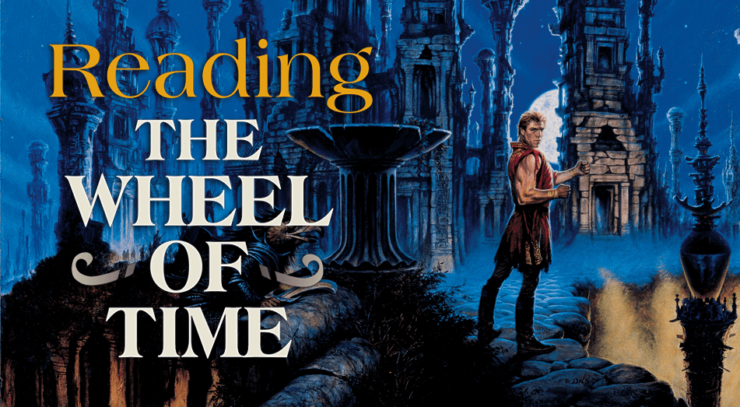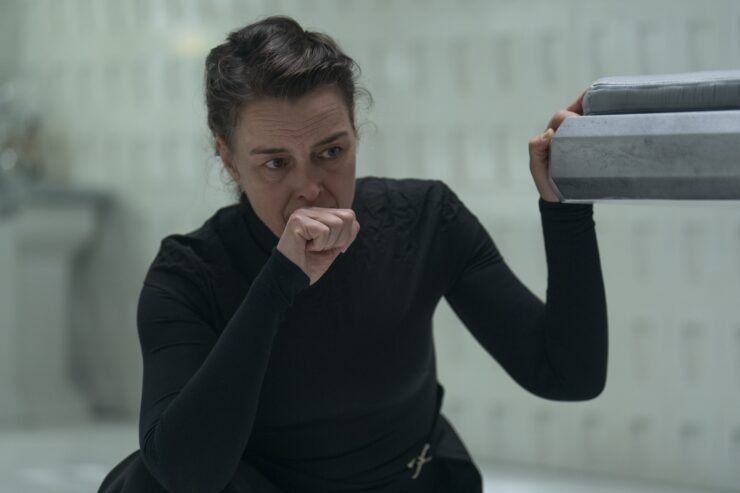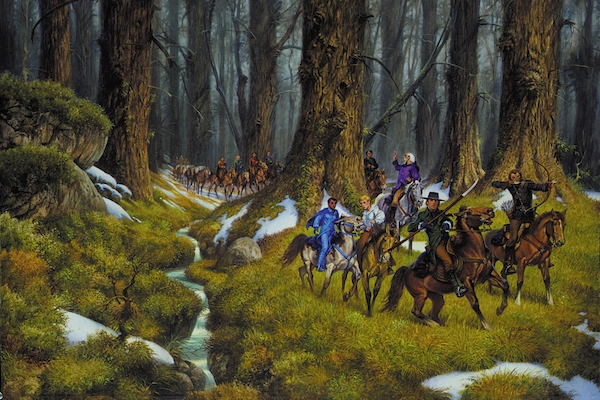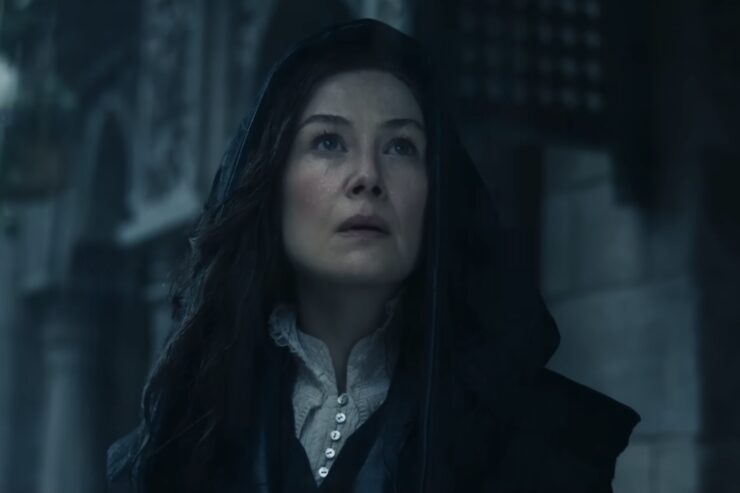This one was a rough week, my friends. Moghedien is out of the frying pan and into the fire, imprisonment speaking, and then there’s… well, everything Morgase is going through. I admit I have been waiting for some interesting Seanchan stuff, though, and I’m weirdly pleased to see Balwer’s intent to screw over Valda. Honestly, I kind of thought he might. The guy is too smart, and he’s not going to just let himself be invalidated and roll over for it.
Moghedien lies asleep, dreaming in a loop about her “rescue” by Halima and her journey to Shayol Ghul and the Pit of Doom. There she was greeted by the unusual Myrddraal that calls itself Shaidar Haran and led into the tunnel where the teeth-like rocks closed down further and further upon her until she was crawling on her belly as “the Great Lord’s fangs” tore at her clothes. Once through, she was knocked down and stood on by the Myrddraal, and then the Great Lord spoke in her mind, telling her of her failure, and Moghedien was sure she was going to be killed. Intending to take the Myrddraal out with her she reached for saidar and found nothing there, almost as if she had been severed. The Myrddraal scraped a knife along her tongue and then nicked her ear.
And as it straightened with her blood and saliva, she knew, even before it produced what appeared to be a tiny, fragile cage of gold wire and crystal. Some things could only be done here, some only to those who could channel, and she had brought a number of men and women for this very purpose.
Moghedien begged for mercy, reminding the Dark One of her service over the years, service made with her whole heart, but the Myrddraal continued the ritual, binding her soul to the cour’souvra. The dream begins over from the beginning.
Eventually the Myrddraal instructs her to wake, and Moghedien prostrates herself and promises to obey calling him Mia’cova, a title that means “One Who Owns Me.” The Myrddraal has taught her what is expected of her, and she always does what she must in order to survive. She is no longer shielded, but knows that channeling near your cour’souvra causes great pain, and can even kill you. Shaidar Haran sends her out of the room and into another place—she finds herself in a well-appointed room with a marble fireplace. The speaker is a tall young man with very blue eyes, who asks her if she enjoyed her time in the vacuole.
Buy the Book
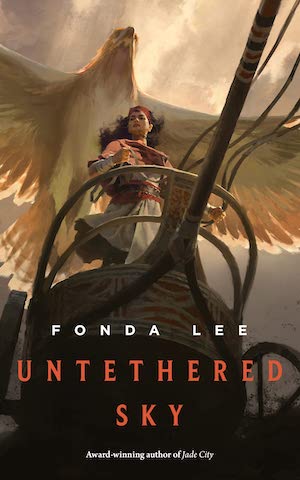

Untethered Sky
She realizes she was imprisoned in a bubble in the pattern—she has heard of such things, though she has never experienced them herself. She knows that vacuoles exist outside the Pattern, and that they can float away or close up with you inside. She also knows that time passes differently there, and is relieved when she is told that she was only there for a few days. She quickly realizes that this very young man knows a great deal for an ordinary Friend of the Dark, and also that there are black flecks floating in his eyes—a sign that he has been granted the ability to use the True Power. She doesn’t know why the Great Lord would allow this man such an honor.
She tries to exert her authority over Moridin, as the man names himself, telling him to bring her wine and promising to explain the honor that he has been given, but he tells her that the time for playing her own game is at an end. She reminds him that she is one of the Chosen, someone whose name would have been used to frighten him when he was little, but he merely responds by displaying that he now holds her cour’souvra. He strokes it with his thumb and she feels the touch on her mind and soul. She knows that if he breaks it the part of her that is her will be separated, and she will become an automaton in his hands.
She calls him Mia’cova, but he tells her there is no need for that now that she has learned her lesson—she is one of the Chosen after all. Still, Moghedien knows that, whatever she calls him and however he treats her, she is still owned.
In Amador, Morgase lies in bed, unable to sleep. In order to escape Asunawa’s torture, she agreed to sleep with Valda, and now she is ashamed of her lack of courage. She hears someone moving in the darkness of her room, and then Breane offers her a drink, which Morgase refuses harshly. Breane tells Morgase off for her self-pity, reminding her that she is still healthy and whole, and complaining that she has the men so on edge that none of them can sleep. She and Lini have kept secret what has happened to Morgase, but promises that she only does so for Lamgwin’s sake, and that she would personally rather that he saw the truth of Morgase’s cowardice.
Tallanvor comes in, followed by Basel Gill and Lamgwin, and then Lini, announcing that something has happened. They go to the window, and after a moment Morgase sees the shadow of the strange creature with giant, bat-like wings, and the figure of a man riding astride it. All she can think is that it must be some kind of shadowspawn. Then there is a flash of light and an explosion, and Morgase recognizes saidar being channeled.
Tallanvor drags her away from the window as a crossbow bolt narrowly misses her, and everyone debates what’s happening, whether the attackers are Shadowspawn or Aes Sedai come to rescue Morgase, whether they should attempt to escape during the confusion. In the end, Morgase orders everyone to wait, and together they all sit in the antechamber.
Outside, they hear the sounds of battle, but eventually they die away into silence. Dawn breaks, and everyone starts to whisper and fidget, but Morgase forces herself to remain patient. Eventually a group of armed men comes in, and their leader perfunctorily identifies Morgase and orders her to come. She is marched down the hallways towards the Lord Commander’s Quarters, and as they pass guards in the hall, Morgase recognizes some of the armor, and some of the men, as Taraboner.
There are a number of people waiting in Valda’s former quarters, and the furniture has been replaced, but Morgase doesn’t have time to notice much as a woman, Alwhin, announces that she is in the presence of “High Lady Suroth, who leads Those Who Come Before, and succors The Return.” The guard forces her prostrate on the floor, and then is told off by Suroth for treating the Queen of Andor in such a way and sent to be punished. Morgase deduces that this is a pre-arranged performance for her benefit.
Morgase learns that these Seanchan claim to be descendants of Artur Hawkwing, returned to claim land they deem as theirs. She trades politely-veiled antagonisms with Suroth. She also notices the collared woman on a leash and is horrified to see the subservient, pet-like way she behaved towards the woman who wears her. She saw other such women in the hall, and is aware that the leashed women can channel. In their conversation, Suroth casually mentions that one of these damane, Pura, was once an Aes Sedai.
Morgase can’t imagine how anyone could hold an Aes Sedai captive, and tries to keep an outward show of composure and indifference. But she can’t hide her shock and disbelief when she learns that a slave woman in a sheer dress, Thera, who Suroth orders to do an evocative dance, is actually Amathera, former Panarch of Tarabon.
Suroth explains to Morgase that everyone has a choice to make, and that she hopes that Morgase will choose to swear the Oath and to rule Andor in the name of the Empress.
“The old King of Tarabon chose to rebel, and died. The old Panarch was captured, yet refused the Oath. Each of us has a place where we belong, unless raised by the Empress, but those who reject their proper place can also be cast down, even to the depths.”
She is escorted back to her chamber where two Taraboners are left to stand guard. Lini and Breane tell her that the men went out to find out what was going on and question her about what she has learned, but Morgase only goes to the window, looking out and considering her options. To herself, she mutters the words that mean her abdication of the throne.
Lini asks what she is doing, and when Morgase responds that she was thinking of Elayne, Lini and Breane pull her away from the window to stop her from jumping. The ensuing argument is interrupted by the return of Tallanvor and the others, accompanied by Sebban Balwer. Balwer reveals that he has made plans to sneak Morgase out of Amador, and the arrival of the Seanchan has precipitated them. Having sworn the Oath, Balwer is free to depart the city.
The two guards are killed and hidden under Morgase’s bed, and then Balwer takes them out of the city, telling the guards that everyone has sworn the Oath to obey, await, and serve. Outside the city he has horses waiting for them, and Morgase is shocked that it is so easy.
Of course, Balwer probably expected some fine reward for rescuing the Queen of Andor. She had not told anyone that that was done with beyond going back; she knew she had spoken the words, and no one else needed to know. Regretting them was useless. Now she would see what sort of life she could find without a throne.
Lini asks why her smile is so sad, but Morgase only answers that there is a long road ahead.
The theme of this week is subjugation. From Moghedien’s cour’souvra, to Morgase’s treatment by Asunawa and Valda, to the various ways the Seanchan debase their slaves, the narrative exposes us to a variety of examples of how the people of this world are subjugated by those who desire power over others, or because subjugation is deemed the appropriate punishment for failure or defeat. We’ve seen plenty of other examples over the course of the story—it’s a strong theme in the narrative—but this week, with these two opposing chapters and two lady M’s, it feels particularly stark.
The Wheel of Time is all about the struggle for power. Roughly speaking, the bad guys are usually seeking it because they feel they are owed it as beings who are superior to their fellow humans, while the good guys need it in order to accomplish their more noble goals. And of course, most people are some mix of “good” and “bad,” so we see a mix of these two motivations in most people—the Aes Sedai are an especially good example of this.
But when it comes to being owed power, to a hierarchical way of thinking about oneself and those on the top of the social heap, so to speak, it often becomes necessary to demonstrate that difference, like how the Tairen High Lords are considered above the law of the land. The Seanchan, however, put even the Tairens to shame when it comes to hierarchy, status, and the demonstration of class differences.
I’m curious as to whether there were any people living on the continent of the Seanchan before Artur Hawkwing’s… son? nephew? and his forces showed up there. If there were, no doubt the existing cultures would have had an affect on the way the current culture developed. Either way, however, we can see aspects of Hawkwing’s ruling style in the Seanchan. In The Eye of the World, Elyas told Egwene and Perrin that, during Artur Hawkwing’s rule:
“A child could ride alone with a bag of gold from the Aryth Ocean to the Spine of the World and never have a moment’s fear, but the High King’s justice was as hard as that rock there for anyone who challenged his power even if it was just by being who they were, or by people thinking they were a challenge. The common folk had peace, and justice, and full bellies, but he laid a twenty-year siege to Tar Valon and put a price of a thousand gold crowns on the head of every Aes Sedai.”
The Seanchan have a very regimented and controlled society as well, and we have seen more than one of them feel scorn for the countries of the Westlands, where there is poverty and hunger among the common folk, where there is civil war and lack of order. In Seanchan, it is the duty of the ruling class to care for the common people and all those under their governance. In Seanchan, if we take the term justice to mean “perfectly enforced rule of law,” the common folk also have peace, justice, and full bellies, while female channelers are leashed and subjugated.
Artur Hawkwing would be pleased, I think.
Seanchan is a nation that treats human beings like animals. The damane have the worst of it, of course, but the display we see of Amathera’s new life isn’t leaps and bounds better. And we know that Amathera’s position is not one reserved solely for captured enemies, either, and that free people can be reduced to the position of slaves as punishment for crimes—or for failures. Those in these extremely subjugated positions are expected to feel contentment and pleasure in their lot in life, as it is considered the correct way of things. People can occasionally be raised up through merit—even to the level of the Blood—just as they can be lowered by failure, so there is some social mobility, but it seems to be rare.
Thus, the general attitude of the Seanchan feels a little too close to that of Darkfriends for comfort. When Ishamale first appeared in Mat, Perrin, and Rand’s dreams pretending to be the Dark One, he mentioned whispering in Artur Hawkwing’s ear and claimed responsibility for both his persecution of the Aes Sedai and his decision to send forces across the Aryth Ocean. It may well be that some of the Seanchan attitudes were indeed influenced by the whispers of the Dark—many cultures’ are, including the Aes Sedai.
My brain, unhelpfully, is trying to decide whether the Seanchan are better or worse than the Children of the Light. Because honestly, I’m a little bit pleased that the Whitecloaks got their butts kicked here—they’ve been evil and smug for too long. And sure, the Whitecloaks don’t have slaves, but they just want to torture and kill everyone who is too different from them, because that is how they identify “darkfriends.” Really, the Whitecloaks think very similarly to the Seanchan in many ways, believing as they do that they have an inherent right to control and rule the world. At least the Seanchan don’t claim to be unassailable representatives of the Light—they’re just claiming human authority as descendants of Hawkwing.
But all that is moot really. The important thing is that Morgase has escaped, and I am happy to see that I was right in suspecting that Balwer would make trouble for Valda—or would have if the Seanchan hadn’t shown up. Niall once observed that Balwer would have served any master as well as he served Niall, but I think he meant that insofar as Balwer is not particularly attached to the mission of the Children of the Light or any other philosophy. He is, however, a highly intelligent man, which means that he knows his own worth and would not tolerate disrespect or give his skills to a leader who was intellectually unworthy of them. Niall wasn’t, and so Balwer respected and served him. It makes sense to me that Balwer would want to pay Valda back for his disrespect, and possibly even to make some small gesture towards avenging Niall.
I also love the fact that the Seanchan’s strict understanding of how their society functions means they have not considered that many of the conquered people of this land might take the Oath under duress and feel no obligation to honor it. It is not their oath, after all, and most of those Westlanders who have sworn it are probably keeping it out of fear, not out of any kind of belief in the oath. But Seanchan society clearly holds the oath as sacred; for them, breaking it is probably akin to breaking the oath Siuan swore to Bryne, “by the light and by the hope of my salvation.” The idea that someone might swear such an oath and then break it is probably almost unfathomable to your average Seanchan.
Speaking of average Seanchan, I almost forgot that we’ve met Alwhin before. It was only because Suroth mentioned that Alwhin “shows great promise in teaching” that it occurred to me to think back. Alwhin is an example of someone who has been raised to a higher station, “Voice of the Blood.” Alwhin’s status is based on the fact that she has knowledge Suroth doesn’t want to get out—it’s basically blackmail that has resulted in her increased status. Which is interesting for a number of reasons—one of which is that sul’dam are not higher in status already.
After all, as Suroth observed in The Shadow Rising, the last time we saw her and Alwhin, the power of the Seanchan, of the Empress, is built on the power of women who can channel. Damane themselves are viewed with fear and disgust because they can channel, but until very recently no one knew that the women capable of becoming sul’dam were also capable of learning. We’ve seen that even certain classes of slaves, such as the Seekers for Truth, can be considered higher than, and have authority over, free people. Somehow, the damane and sul’dam seem to be separate from this system, though. Perhaps the sul’dam are viewed as unclean because they work with the damane. They are too close to the One Power.
I also just remembered the story that sometimes the Empress would attach a damane’s bracelet to a man to see if anything would happen, knowing that in some cases it could cause severe pain or kill him, as well as the damane. Apparently as a form of entertainment, not just as punishment, so… yeah. Definitely no guarantee of justice in the Seanchan Empire.
Suroth’s argument that everyone has choices is an interesting one, given that all the choices she sees are an either/or. Again that hierarchical way of thinking—she states that everyone has their place, but if you reject your place you can be cast down. The choice, in her mind, is either acceptance of an immutable truth, or degradation. Of course, she would hardly present this choice to Morgase, her conquered prisoner, in anything but black and white, but I do think that she really believes what she is saying, that she sees everyone’s life in this light, including her own. It is interesting, too, that once again someone is offering to restore Morgase to the throne, but this offer is even more compromising than the last. She was ready to make an extremely unpalatable deal with Niall because she saw it as better than leaving Andor to Rand, but this is a deal with the devil, and she wouldn’t even consider it. Instead, she chooses to abdicate, deciding that the best thing she can do for Andor is to make way for Elayne to claim the throne.
Chapter 26 opens with Morgase bemoaning what she sees as a lack of courage, with her being accused of self-pity and selfish weakness by Breane, and I really don’t think that’s fair. Of course, neither woman realizes that Morgase isn’t at fault for what happened with Lord Gaebril. If Morgase and her followers knew that this whole mess only came about because one of the Forsaken used Compulsion on Morgase for months, they wouldn’t hold her responsible for their current circumstances, and would probably admire her strength in being able to escape his control in the first place. But since Breane believes that the events that led to Morgases’s capture and treatment by the Whitecloaks ultimately came about because of her selfish infatuation with a man, it’s probably harder to have empathy for her now.
Also, in Breane’s defense, she was being gentle and kindly towards Morgase until Morgase lashed out at her.
But Morgase’s attitude towards Breane, and towards Tallanvor, is all about her trying to hold onto the attitude and dignity of her identity as Queen of Andor. So much was stripped away, it no doubt made her cling to the little things the more, such as how someone of a lower status should speak to her, or how her orders should be obeyed without question.
As for her choice to accept sex with Valda instead of torture under Asunawa, a modern reader should see no shame in that. Just like Suroth, Valda presented Morgase with a choice that was no choice at all, and both will leave Morgase with long term scars. The attitudes of this world are old-fashioned, and there are heavy stigmas around sex in many countries, especially for women. We’ve seen how Rand, a citizen of Andor, feels about sex without marriage. And Morgase is a noblewoman, a Queen—for her, this rape represents not only an assault, but a further loss of who she was. There might be extra shame as she remembers her time with “Gaebril” as well.
Morgase considers that she wasn’t able to continue to fight, to do what needed to be done, under Asunawa’s torture, but I’m not sure what she means by that, unless she considered enduring for enduring’s sake to be what needed to be done. Suffering under torture would not get her closer to her goal, and though she could not know it, her choice to accept Valda’s assault instead of Asunawa’s might very well have made the difference in her ability to escape now. The fact that she chose to submit to Valda purely because she couldn’t take any more torture is irrelevant; if she had remained with Asunawa, she might have been locked away with him somewhere instead of in her own room where her allies and Balwer could reach her. She might have been too injured to travel with them when the opportunity presented itself.
The moment Lini and Breane realize that Morgase is contemplating suicide is a powerful one, and I really felt for all three women. Suroth presented only two choices for Morgase, but there were more available. I’m very, very glad that it was escape, not suicide, in the end, but I see bravery in Morgase even here. I’m hopeful that her abdication will lift a little of these pressures from Morgase’s shoulders. As an Andoran citizen rather than the Andoran Queen, she may feel less pressure on her shoulders to behave a certain way, to maintain a certain image. Yes, she will always be a noble of Andor, but her dignity now will be solely her own. I do wonder how Tallanvor, and the others, will react to learning that she is no longer the Queen. And I wonder if she isn’t deliberately keeping them in the dark partly to maintain distance and some sense of authority over them.
We’ll do two more chapters again next week, but I haven’t read them yet so I can’t yet allude to what’s to come. I live in anticipation!
Sylas K Barrett hopes that Perrin’s adventures are going to be at least a little bit of a reprieve from this dark section, but that might be a lot to hope. Also, there’s probably going to be more Faile drama.










